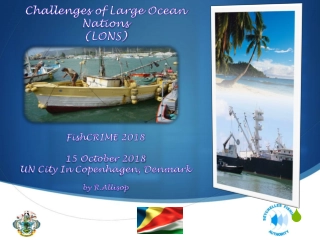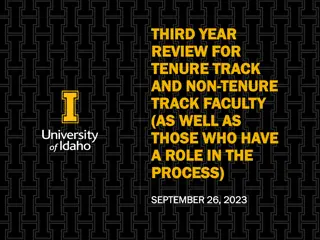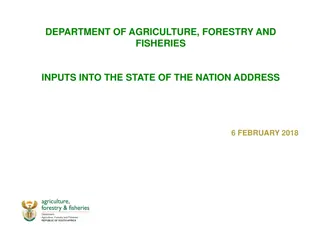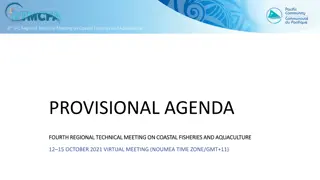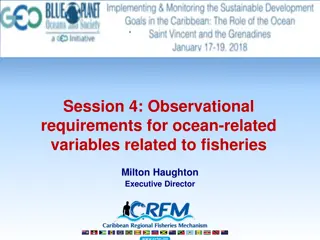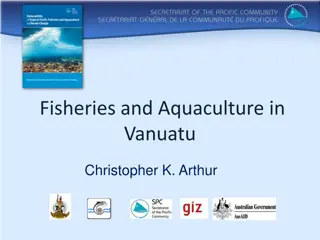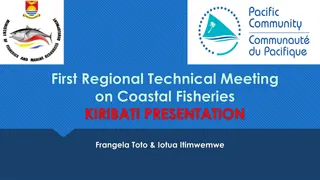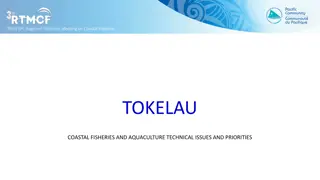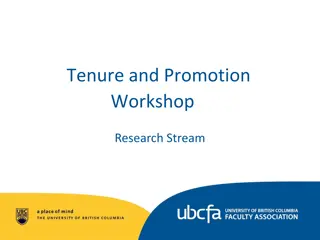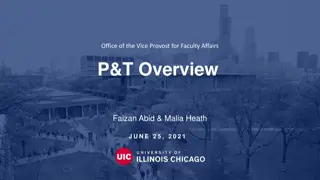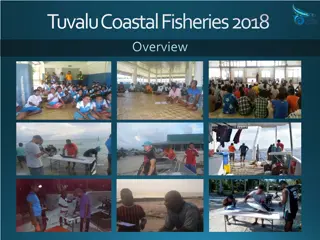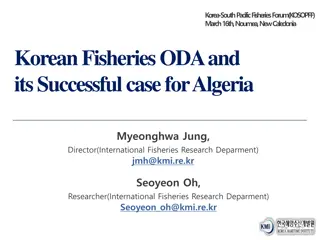Challenges and Solutions for Tenure Rights in Fisheries Value Chain
Various countries like Sri Lanka, Pakistan, and India are facing challenges with tenure rights to land and resources along the fisheries value chain, impacting both men and women. Issues include displacement for development projects, lack of recognition of customary rights, and encroachment on natural rights. Solutions involve formal recognition of tenure rights, granting individual and collective ownership, and ensuring equitable access for both genders.
Download Presentation

Please find below an Image/Link to download the presentation.
The content on the website is provided AS IS for your information and personal use only. It may not be sold, licensed, or shared on other websites without obtaining consent from the author.If you encounter any issues during the download, it is possible that the publisher has removed the file from their server.
You are allowed to download the files provided on this website for personal or commercial use, subject to the condition that they are used lawfully. All files are the property of their respective owners.
The content on the website is provided AS IS for your information and personal use only. It may not be sold, licensed, or shared on other websites without obtaining consent from the author.
E N D
Presentation Transcript
Group 3 Discussion on Tenure Rights
Do you enjoy tenure rights, individually and collectively, to housing and other land resources needed for your activities along the fisheries value chain? How can these rights be made more equitable and secure for both men and women? Srilanka No customary right are recognized in Srilanka. Totally controlled by the law of the country- there are fisheries management acts. The species that are caught, gear. 1 year license- mainly to use the sea not for coast. Losing tenure rights to coast & land as they are being converted into tourism, SEZ, port, infrastructure- beach siene operations are being lost due to infrastructure and tourism development. license was given for shore siene operations but now these rights are being taken away. People were displaced for promotion of tourism, hotel construction. Some places on the coast declared as Integrated tourism dev zone. Situation in inland is worse- competition between farmers and fishers. Fishers are losers. Once the fishers get the rights they can have arrangements for equity.
Pakistan There are no tenure right in sea areas. Now less water is released from upstream as barrages have been built. In addition when ponds dry, the land is reclaimed for cultivation. Climate change is also plays a role. In sea areas also land is reclaimed for creating housing societies. Should stop reclamation of marine areas
India No tenure rights in India. In Maharastra- Big developmental projects are coming to the coast are asking them to vacate the coast. Many women are involved in small-scale fishing and shrimp farming so they will get impacted Govt should protect us, make tenure rights available to us. Dry fish area is also being grabbed by the govt. Eg : In Mumbai Koliwada people who have been living there since the British era are to be displaced for development of infrastructure and housing. Customary rights also should be recognized. In Gujarat, near Gulf of Kutch, govt has built wind farms. Salt industry has built a bund which has destroyed the intertidal zone has completely. Pagadia fishing area is in threat due to all these.
question of right arises when natural customary rights are encroached. Asking for right indicates people are disempowered. In the fishery value chain there is no recognition of rights apart from private land Measures are- granting of rights individual or collective ownership or usurfruct rights Both men women should have titles to the land they use. The lands exclusively by women should be in the name of women- like land for drying and sorting Need for formally recognized tenure rights
Do you enjoy tenure rights to fishery resources, to the coast and riparian areas for men and women fishers and fish processors? Are they formal rights or traditional/indigenous/customary rights? Do tenure rights, for example, recognize the role of small-scale fishing communities to restore, conserve, protect and co-manage local aquatic and coastal ecosystems? Srilanka- Fisheries management law was brought in action 1996 but there is no clear definition of who the fisher are. So, any one can enter who has money or political support but the traditional fishers might not get the license. Identification of community is important. For eg-earlier they would inherit rights to fishing but now its not given in case of govt interest in the area for other projects. Culture of sea cucumbers is happening in the area. Govt has given license to other industry. These areas were originally used by SSF for fishing now they working as labour in the the sea cucumber farms. The fishery resources have also depleted due to sea cucumber farming. Conversion of SSF into labor in same sector.
Pakistan resonated the same thing. No legal rights. Whenever the govt wants to displace they do. Anyone can get a license and fish. So industrialists can enter. There is a need to register every traditional and small-scale fisher.
India- Records are present for the mechanized boat but for small boats, and other fishers, allied fishworkers, fishers fishing in creeks, govt doesn t maintain records. Govt doesn t give any license to fish vendors. So govt doesn t think of their rights as there is no recognition. Even if license is given, it is for operations but not for resources. So if a port comes, access to fish resources is lost. For eg inland waterways has come- there is conflict with fishers, fly ash contaminates the water. There is no legally recognized rights for fishery resources. In some areas waterbodies are leased out to fishers or entrepreneurs. There is a need to legally recognize the fish farming titles. Once, they loose the lease, they become contract labourers. Protection and conservation of the resources is integral to bringing tenure rights as if the resources do not exist then the rights are of no use.
What kind of threats are facing fishing communities related to their access to land or water bodies? How are the tenure rights able to withstand and overcome these threats? Pakistan SSF were displaced in the name of development and new city development with high rise buildings. The way to open sea has been disrupted. Even rights to navigation is not provided due to security reasons. Mangroves are also being cut. Coal power plant are being built in the traditional areas of SSF.
Are there effective mechanisms to resolve disputes over tenure rights and to ensure availability of remedies such as restitution, indemnity, just compensation and reparation? No effective mechanism as mentioned by India and Pak. Non-Voluntary resettlement policy by govt in Srilanka has come.
Conclusions Worst condition for these 3 countries in terms of recognition of legal tenure rights. The so called development projects are the main reason for conflict such as building coastal cities, ports etc. Fishers are not even consulted before implementing development projects.


